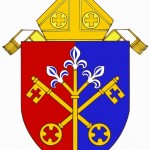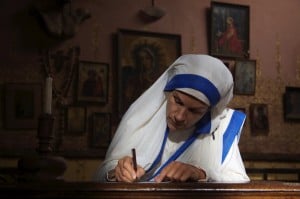Reverend Sister Marianne
Matron of the Bishop Home, Kalaupapa
To see the infinite pity of this place,
The mangled limb, the devastated face,
The innocent sufferers smiling at the rod,
A fool were tempted to deny his God.He sees, and shrinks; but if he look again,
Lo, beauty springing from the breast of pain!—
He marks the sisters on the painful shores,
And even a fool is silent and adores.Robert Louis Stevenson
Kalawao, May 22, 1889
On November 16-18, the U.S. Conference of Catholic Bishops will convene in Baltimore for their Fall General Assembly. Among items for discussion this year, the bishops will consider whether to add the memorials of Blessed John Paul II (on October 22) and Blessed Marianne Cope (on January 23) to the U.S. liturgical calendar.
“Uh-oh,” I think, looking at the new Chapel Edition of the Roman Missal sitting on my desk. The new translation of the liturgy won’t be implemented until November—but already the book needs revision, because these memorials are not included. This is proof positive that our Church is a living, breathing entity: Just as God welcomes new saints into His Kingdom, so the Church welcomes the saints’ insights, their example, the inspiration they have left us, and continues to embrace their memory, to draw upon their wisdom and to honor their contributions to the faith.
But here’s my question: Everyone knows of Pope John Paul II, right? But do you know anything at all about Marianne Cope? Here is her story.
* * * * *
Maria Anna Barbara Koob was born January 23, 1838 in Heppenheim in the Grand Duchy of Hesse (modern-day Germany). When she was just a year old, her family emigrated to the United States—settling in the farming community of Utica, New York.
From early childhood Maria Anna was attracted to religious life. Attending school at the Parish of St. Joseph, she admired the sisters who had devoted their lives to Christ. However, her vocation was to be delayed: Her father became an invalid when Maria Anna was in eighth grade, and she went to work in a factory to help support her family. At age 24, when her younger siblings were old enough to assume responsibility for the family and after her father had died, Maria Anna entered the Sisters of the Third Order Regular of Saint Francis, based in Syracuse, New York.
After one year in the novitiate, Maria Anna received the habit of the Franciscan sisters and with it, her new name: Sister Marianne. She became a schoolteacher, then a principal, at newly established schools for German-speaking immigrants in the region.
By the 1860s, Sister Marianne had been elected to the Governing Council of her religious order; and in that role, she was instrumental in opening two new hospitals in Central New York. She was appointed by the Superior General to direct St. Joseph’s Hospital, the first public hospital in Syracuse, and she served in that role from 1870-1877.
Unlike other hospitals of the time, the Franciscan hospitals stipulated in their Charter that medical care was to be provided to all, regardless of race or creed. She helped to further patients’ rights, insisting in a letter of negotiations with the Medical College at Syracuse University that it was the right of the patient in each and every case to decide whether or not he or she wished to be brought before medical students. Sister Marianne was often criticized for accepting into treatment “outcast” patients such as alcoholics, who were spurned by hospitals at the time; but she was well-known and loved among New Yorkers for her kindness, wisdom and down-to-earth practicality.
In 1883, Mother Marianne—by that time the Provincial Mother in Syracuse—received a letter from a Catholic priest asking for help managing hospitals and schools in the Hawaiian Islands, mainly caring for leprosy patients. She responded enthusiastically, writing,
“I am hungry for the work and I wish with all my heart to be one of the chosen ones, whose privilege it will be to sacrifice themselves for the salvation of the souls of the poor Islanders…. I am not afraid of any disease; hence, it would be my greatest delight even to minister to the abandoned ‘lepers’.”
With six other Sisters of St. Francis, Mother Marianne arrived at Honolulu in November 1883. The sisters would manage and serve at the Kaka’ako Branch Hospital on Oahu, a receiving station where Hansen’s disease (leprosy) patients from throughout the Hawaiian Islands were sent to prevent further spread of the disease. Within two years, the sisters had cleaned the hospital and treated the 200 patients, making major improvements in living conditions; and in 1905 they founded the Kapi’olani Home, a residence for the daughters of leprosy patients, within the walls of the hospital compound. Fear of the disease had made public officials unwilling to care for the close relatives of those afflicted by the disease; only the sisters would welcome them and offer the home and education that these girls needed.
 In January 1884, Mother Marianne met Fr. Damien de Veuster, who would become known as the “apostle to the lepers.” Two years later, after Father Damien had been diagnosed with Hansen’s disease, the Church and the Government were afraid to welcome him; only Mother Marianne offered hospitality, after hearing that his condition had made him an outcast. In 1888, in the last months of Father Damien’s life, Mother Marianne became his caretaker—promising him that she would continue to care for the patients at the Boys’ Home at Kalawao which he had founded.
In January 1884, Mother Marianne met Fr. Damien de Veuster, who would become known as the “apostle to the lepers.” Two years later, after Father Damien had been diagnosed with Hansen’s disease, the Church and the Government were afraid to welcome him; only Mother Marianne offered hospitality, after hearing that his condition had made him an outcast. In 1888, in the last months of Father Damien’s life, Mother Marianne became his caretaker—promising him that she would continue to care for the patients at the Boys’ Home at Kalawao which he had founded.
After Father Damien’s death Mother Marianne, with Sr. Leopoldina Burns and Sr. Vincentia McCormick, cared for 103 girls at the Bishop Home for Girls, and operated the Home for Boys. Her cheerful countenance was an encouragement to the children and to the religious sisters in her order. Never fearful that she would contract leprosy herself, she said,
“God giveth life; He will take it away in His own good time. Meanwhile it is our duty to make life as pleasant and as comfortable as possible for those of our fellow-creatures whom He has chosen to afflict.”
Mother Marianne Cope, O.S.F., never contracted leprosy. She and her sisters were honored in the poem (above) written by Robert Louis Stevenson in 1889. She died of natural causes on August 19, 1918, and was buried at the Bishop Home.
On April 19, 2004, Pope John Paul II issued the decree officially naming her Venerable. She was among the first group of people to be beatified by Pope Benedict XVI, and is now often referred to as Blessed Marianne of Molokaʻi.
Her feast day (January 23) is celebrated by her Congregation, as well as by the Diocese of Honolulu and the Diocese of Syracuse. Should the U.S. Bishops, at their November meeting, vote to approve her memorial for the whole church in the United States, that day will become a day of celebration and commemoration for all American Catholics.















